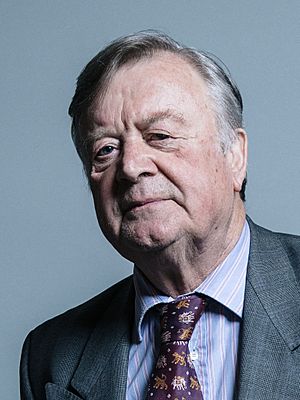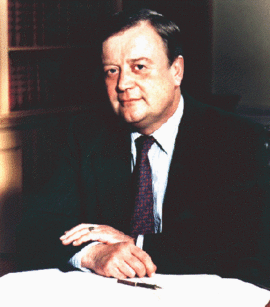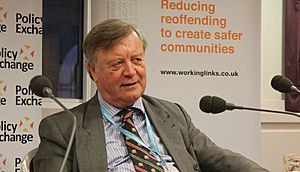Kenneth Clarke facts for kids
Quick facts for kids
The Lord Clarke of Nottingham
|
|||||||||||||||||||||||||||||||||||||||||||||||||||||||||||||||||
|---|---|---|---|---|---|---|---|---|---|---|---|---|---|---|---|---|---|---|---|---|---|---|---|---|---|---|---|---|---|---|---|---|---|---|---|---|---|---|---|---|---|---|---|---|---|---|---|---|---|---|---|---|---|---|---|---|---|---|---|---|---|---|---|---|---|

Official portrait, 2017
|
|||||||||||||||||||||||||||||||||||||||||||||||||||||||||||||||||
|
|||||||||||||||||||||||||||||||||||||||||||||||||||||||||||||||||
| In office 12 May 2010 – 4 September 2012 |
|||||||||||||||||||||||||||||||||||||||||||||||||||||||||||||||||
| Prime Minister | David Cameron | ||||||||||||||||||||||||||||||||||||||||||||||||||||||||||||||||
| Preceded by | Jack Straw | ||||||||||||||||||||||||||||||||||||||||||||||||||||||||||||||||
| Succeeded by | Chris Grayling | ||||||||||||||||||||||||||||||||||||||||||||||||||||||||||||||||
| Chancellor of the Exchequer | |||||||||||||||||||||||||||||||||||||||||||||||||||||||||||||||||
| In office 27 May 1993 – 2 May 1997 |
|||||||||||||||||||||||||||||||||||||||||||||||||||||||||||||||||
| Prime Minister | John Major | ||||||||||||||||||||||||||||||||||||||||||||||||||||||||||||||||
| Preceded by | Norman Lamont | ||||||||||||||||||||||||||||||||||||||||||||||||||||||||||||||||
| Succeeded by | Gordon Brown | ||||||||||||||||||||||||||||||||||||||||||||||||||||||||||||||||
| Home Secretary | |||||||||||||||||||||||||||||||||||||||||||||||||||||||||||||||||
| In office 10 April 1992 – 27 May 1993 |
|||||||||||||||||||||||||||||||||||||||||||||||||||||||||||||||||
| Prime Minister | John Major | ||||||||||||||||||||||||||||||||||||||||||||||||||||||||||||||||
| Preceded by | Kenneth Baker | ||||||||||||||||||||||||||||||||||||||||||||||||||||||||||||||||
| Succeeded by | Michael Howard | ||||||||||||||||||||||||||||||||||||||||||||||||||||||||||||||||
| Secretary of State for Education and Science | |||||||||||||||||||||||||||||||||||||||||||||||||||||||||||||||||
| In office 2 November 1990 – 10 April 1992 |
|||||||||||||||||||||||||||||||||||||||||||||||||||||||||||||||||
| Prime Minister |
|
||||||||||||||||||||||||||||||||||||||||||||||||||||||||||||||||
| Preceded by | John MacGregor | ||||||||||||||||||||||||||||||||||||||||||||||||||||||||||||||||
| Succeeded by | John Patten (Education) | ||||||||||||||||||||||||||||||||||||||||||||||||||||||||||||||||
| Secretary of State for Health | |||||||||||||||||||||||||||||||||||||||||||||||||||||||||||||||||
| In office 25 July 1988 – 2 November 1990 |
|||||||||||||||||||||||||||||||||||||||||||||||||||||||||||||||||
| Prime Minister | Margaret Thatcher | ||||||||||||||||||||||||||||||||||||||||||||||||||||||||||||||||
| Preceded by | John Moore (Social Services) | ||||||||||||||||||||||||||||||||||||||||||||||||||||||||||||||||
| Succeeded by | William Waldegrave | ||||||||||||||||||||||||||||||||||||||||||||||||||||||||||||||||
| Minister without Portfolio | |||||||||||||||||||||||||||||||||||||||||||||||||||||||||||||||||
| In office 4 September 2012 – 14 July 2014 |
|||||||||||||||||||||||||||||||||||||||||||||||||||||||||||||||||
| Prime Minister | David Cameron | ||||||||||||||||||||||||||||||||||||||||||||||||||||||||||||||||
| Preceded by | The Baroness Warsi | ||||||||||||||||||||||||||||||||||||||||||||||||||||||||||||||||
| Succeeded by | Robert Halfon (2015) | ||||||||||||||||||||||||||||||||||||||||||||||||||||||||||||||||
| Chancellor of the Duchy of Lancaster | |||||||||||||||||||||||||||||||||||||||||||||||||||||||||||||||||
| In office 13 July 1987 – 25 July 1988 |
|||||||||||||||||||||||||||||||||||||||||||||||||||||||||||||||||
| Prime Minister | Margaret Thatcher | ||||||||||||||||||||||||||||||||||||||||||||||||||||||||||||||||
| Preceded by | Norman Tebbit | ||||||||||||||||||||||||||||||||||||||||||||||||||||||||||||||||
| Succeeded by | Tony Newton | ||||||||||||||||||||||||||||||||||||||||||||||||||||||||||||||||
|
|||||||||||||||||||||||||||||||||||||||||||||||||||||||||||||||||
|
|||||||||||||||||||||||||||||||||||||||||||||||||||||||||||||||||
|
|||||||||||||||||||||||||||||||||||||||||||||||||||||||||||||||||
| Personal details | |||||||||||||||||||||||||||||||||||||||||||||||||||||||||||||||||
| Born |
Kenneth Harry Clarke
2 July 1940 Nottingham, England |
||||||||||||||||||||||||||||||||||||||||||||||||||||||||||||||||
| Political party | Conservative | ||||||||||||||||||||||||||||||||||||||||||||||||||||||||||||||||
| Spouse |
Gillian Edwards
(m. 1964; died 2015) |
||||||||||||||||||||||||||||||||||||||||||||||||||||||||||||||||
| Children | 2 | ||||||||||||||||||||||||||||||||||||||||||||||||||||||||||||||||
| Alma mater | Gonville and Caius College, Cambridge (BA, LLB) | ||||||||||||||||||||||||||||||||||||||||||||||||||||||||||||||||
Kenneth Harry Clarke, Baron Clarke of Nottingham (born 2 July 1940) is a British politician. He was a Member of Parliament (MP) for Rushcliffe from 1970 to 2019. He also served as Home Secretary and Chancellor of the Exchequer.
Clarke was a member of the Conservative Party. He held important roles in the governments of Margaret Thatcher and John Major. He was known for his pro-European views. After leaving the House of Commons, he became a life peer in the House of Lords in 2020.
Contents
Early Life and Education
Kenneth Harry Clarke was born in Nottingham, England. His father was a mining electrician. Kenneth grew up in Langley Mill, Derbyshire.
He earned a scholarship to Nottingham High School. Later, he studied law at Gonville and Caius College, Cambridge. While at Cambridge, he joined the Conservative Party. He became President of the Cambridge Union in 1963. After university, he became a lawyer in 1963.
Parliamentary Career Highlights
Clarke first tried to become an MP in 1964 and 1966. In June 1970, just before his 30th birthday, he was elected as the MP for Rushcliffe.
He became a government Whip from 1972 to 1974. He helped the government win votes on Britain joining the European Communities (which later became the European Union). Even though he didn't support Margaret Thatcher becoming Conservative Party Leader in 1975, he served in many government roles under her.
From 2017 to 2019, he was the Father of the House. This title goes to the longest-serving MP. In September 2019, he was no longer part of the Conservative Party group in Parliament. He then sat as an independent MP. He retired from Parliament in the 2019 general election.
Early Government Roles
Clarke's first government jobs were in Margaret Thatcher's government. He worked in the Department for Transport from 1979 to 1982. Then he was a Minister of State for Health from 1982 to 1985.
He joined the Cabinet as Paymaster General and Employment Minister from 1985 to 1987. He also served as Chancellor of the Duchy of Lancaster from 1987 to 1988. In this role, he helped sell the Rover Group (a car company) to British Aerospace.
Health Secretary Role
In July 1988, Clarke became the first Secretary of State for Health. He helped introduce the "internal market" idea to the NHS. This meant hospitals could become self-governing NHS Trusts. They would control their own budgets. Doctors could also become "GP fundholders" and manage their own budgets.
These changes aimed to make the NHS more efficient. Hospitals would compete for patients, and money would follow the patient. This meant more efficient hospitals would get more funding.
Some doctors and their union, the British Medical Association, were against these changes. They said the NHS was "underfunded" and "under threat." However, by 1994, most hospitals had become trusts. Studies suggest these changes led to shorter waiting times for patients.
Clarke also faced questions about a health issue involving contaminated blood. A public inquiry into this matter began in 2017.
Later Government Roles
After his time as Health Secretary, Clarke became Secretary of State for Education and Science in 1990. He introduced several reforms in education.
In 1992, after the Conservatives won the general election, he became Home Secretary. In May 1993, he was appointed Chancellor of the Exchequer. This is a very important role, in charge of the country's money.
Chancellor of the Exchequer Achievements
As Chancellor, Clarke had a successful time. The economy recovered from a recession. He lowered the basic rate of income tax from 25% to 23%. He also reduced government spending and the budget deficit.
During his time, interest rates, inflation, and unemployment all decreased. His successor, Gordon Brown, continued many of his policies.
Views on the Euro
Clarke was a strong supporter of Britain being part of the European Union. He believed in having a "free choice" about joining the euro (the currency used by many EU countries).
In 1996, there was discussion about holding a referendum (a public vote) on joining the euro. Clarke was against this idea at the time. He felt it would give too much power to the idea of leaving the EU.
Life as a Backbencher
After the Conservative Party lost the 1997 election, Clarke tried to become the party leader three times (in 1997, 2001, and 2005). He was popular with the public, but his pro-European views were different from many party members. He did not win the leadership.
He became known for his support of economic and social freedom, and for his strong belief in the "European idea."
Return to Government
In 2009, Clarke returned to the frontbench as Shadow Business Secretary. In May 2010, he was appointed Secretary of State for Justice and Lord Chancellor in the new Coalition Government.
As Justice Secretary, he suggested changes to prison sentences. He believed that short prison sentences were not always effective for helping people change. He also wanted to look closely at the relationship between the European Court of Human Rights and national laws.
In 2011, there was some discussion about his views on sentencing for certain crimes. He also faced criticism for parts of his Justice and Security Bill, which allowed for secret trials in some national security cases.
Minister without Portfolio
In 2012, Clarke became a Minister without Portfolio. This meant he had a role in government but without a specific department. He also became a Prime Ministerial Trade Envoy, promoting British business around the world.
In 2014, after more than 20 years as a Minister, he left the government. He was given the honour of Companion of Honour. His time as a minister is one of the longest in modern British history.
Later Parliamentary Years
Clarke was against Brexit (Britain leaving the European Union) in the 2016 referendum. He was the only Conservative MP to vote against starting the process to leave the EU.
In 2017, he became the Father of the House after the death of Gerald Kaufman. In December 2017, he voted against the government to ensure Parliament had a "meaningful vote" on any Brexit deal.
In September 2019, Clarke and 20 other Conservative MPs voted against the government's plan for Brexit. Because of this, they were no longer part of the Conservative Party group in Parliament and sat as independents. Clarke said he no longer recognized the Conservative Party. He retired from the House of Commons in the 2019 general election.
Joining the House of Lords
In 2020, he was made a life peer and became Baron Clarke of Nottingham. He joined the House of Lords, which is the second chamber of the UK Parliament. He gave his first speech there on 28 September 2020.
Other Work and Interests
While not in government, Clarke held several non-executive director roles in companies like British American Tobacco and Foreign & Colonial Investment Trust.
He also did media work, presenting jazz programmes on BBC Radio Four. He wrote columns for newspapers and appeared on television.
Clarke married Gillian Edwards in 1964, and they had two children. Gillian passed away in 2015.
He is known for his love of cigars, jazz, and motor racing. He also enjoys birdwatching and reading political history. He is a supporter of local football clubs Notts County and Nottingham Forest. He is also a fan of Formula One motorsport. He even presented a trophy at the 2012 British Grand Prix.
Clarke is a fan of real ale and has been an active member of the Campaign for Real Ale (CAMRA). His memoir, Kind of Blue, was published in 2016.
Honours and Awards

- UK Baron, 2020
- Companion of Honour (CH), 2014
- Privy Counsellor (PC), 1985
- Queen's Counsel (now KC), 1980
- Honorary Bencher of Gray's Inn, 1989
- Honorary doctorate of Laws (Hon. LLD) from Nottingham (1989) and Huddersfield (1993)
- Honorary doctorate of the University (Hon. DUniv) from Nottingham Trent (1996) and Derby (2017)
- Honorary Fellowship of Gonville and Caius College, Cambridge, 2013
- Honorary Fellowship of the Chartered Institute of Taxation (Hon. FTI), 2016
See also
 In Spanish: Kenneth Clarke para niños
In Spanish: Kenneth Clarke para niños
 | Bayard Rustin |
 | Jeannette Carter |
 | Jeremiah A. Brown |



